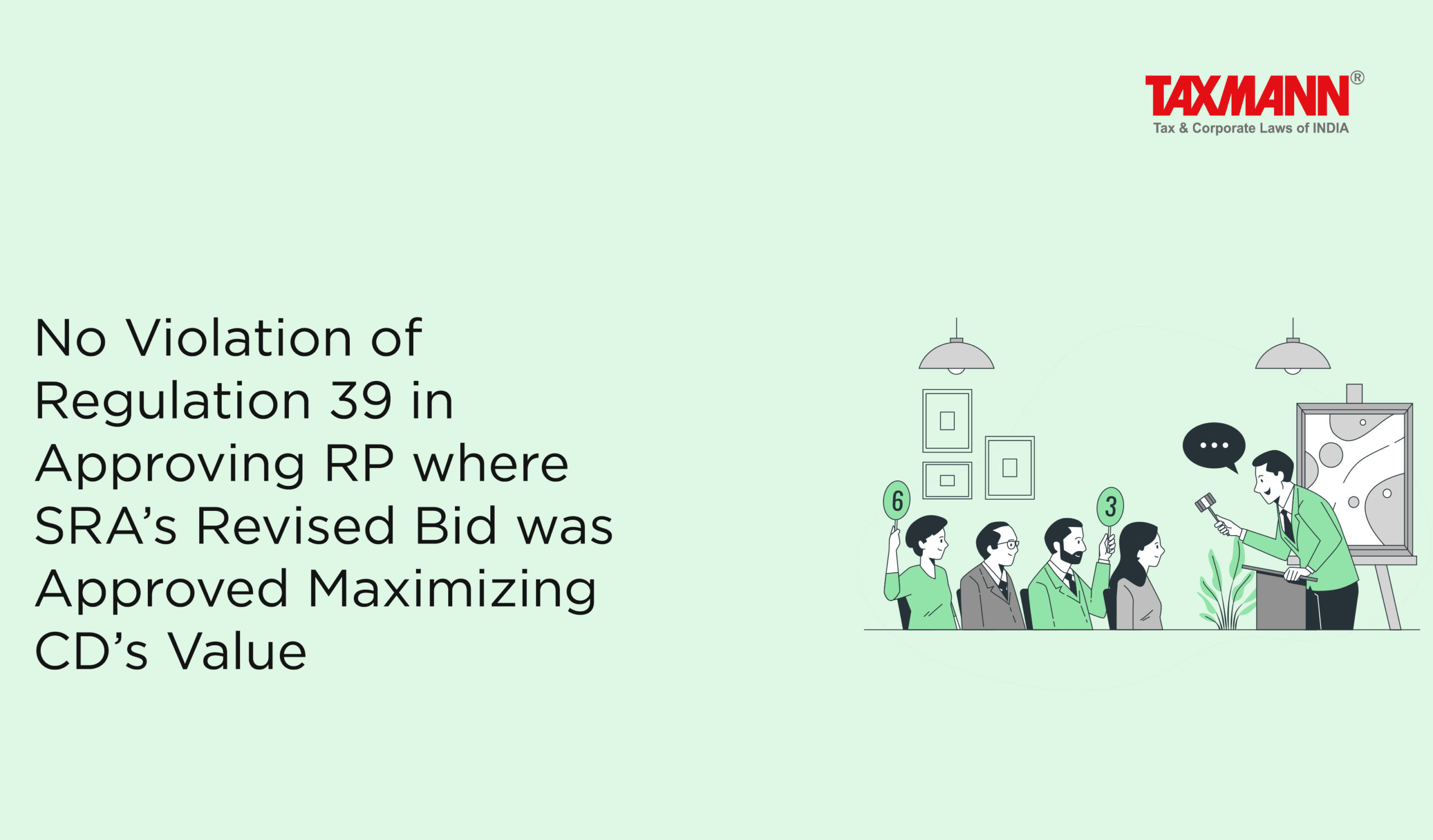No Violation of Regulation 39 in Approving RP where SRA’s Revised Bid was Approved Maximizing CD’s Value
- Blog|News|Insolvency and Bankruptcy Code|
- 2 Min Read
- By Taxmann
- |
- Last Updated on 4 July, 2023

Case Details: Consortium of Prudent ARC Ltd. v. Ravi Shankar Devarakonda - [2023] 152 taxmann.com 21 (NCLAT-Chennai)
Judiciary and Counsel Details
-
- M. Venugopal, Judicial Member & Shreesha Merla, Technical Member
- Srinath Sridevan, Sr. Adv. & Ms Deepika Murali, Adv. for the Appellant.
- P.H. Arvindh Pandian, Sr. Adv., Vinod Kumar, Srinivasan M.D., Advs., P.S. Raman, Sr. Adv., Ms Surabhi Khattar, Adv, Gopal Jain, Sr. Adv., Adithya Reddy & Diwakar Maheshwari, Advs. for the Respondent.
- S. Niranjan Reddy, Senior Adv. for the Applicant.
- S. Ravi, Senior Adv. & Vivek Reddy, Senior Adv. for the Respondent.
Facts of the Case
In the instant case, the CIRP of the corporate debtor was initiated. A list of prospective resolution applicants was drawn up and the appellant/resolution applicant submitted its plan to the RP. The RP filed an IA seeking an extension in the CIRP period, which was allowed by the Adjudicating Authority (NCLT).
The RP called for improvised plans from prospective resolution applicants. Subsequently, the RP filed another IA seeking a further extension in the CIRP period and sought permission to re-run the Expression of Interest (EOI) process. The appellant once again submitted a resolution plan, and there were three prospective resolution applicants including ‘V.
The RP and CoC decided to run a challenge process to modify the submitted resolution plans. ‘V’ revised the submitted plan by way of an addendum and the same was approved by the CoC. The appellant filed an application seeking to restrain the CoC and RP from proceeding with the challenge process, and to direct the RP to accept the resolution plan as submitted after the re-run of EOI. However, the same was dismissed by the NCLT vide the impugned order.
The appellant filed an instant appeal, contending that allowing more than one modification in a resolution plan, either by way of revision or challenge mechanisms, was contrary to Regulation 39(1A) of the IBBI (Insolvency Resolution Process for Corporate Persons). The appellant argued that the RP ought to have rejected any process which was not in compliance with the provisions of the Code and CIRP Regulations.
It was noted that the decision to co-run the challenge process was taken by the CoC to maximize the value of the corporate debtor and ‘V’ submitted a revised bid with an increase from its initial bid.
NCLAT Held
The NCLAT held that the decision to conduct the challenge process was approved by the CoC by a majority of 99% and after the closing of voting lines of the said process, the resolution plan of ‘V’ was approved by a majority. Therefore, there was no violation of Regulation 39 of the IBBI Regulations. Thus, there was no substantial reason to interfere with the impugned order. Accordingly, the appeal was to be dismissed.
Disclaimer: The content/information published on the website is only for general information of the user and shall not be construed as legal advice. While the Taxmann has exercised reasonable efforts to ensure the veracity of information/content published, Taxmann shall be under no liability in any manner whatsoever for incorrect information, if any.

Taxmann Publications has a dedicated in-house Research & Editorial Team. This team consists of a team of Chartered Accountants, Company Secretaries, and Lawyers. This team works under the guidance and supervision of editor-in-chief Mr Rakesh Bhargava.
The Research and Editorial Team is responsible for developing reliable and accurate content for the readers. The team follows the six-sigma approach to achieve the benchmark of zero error in its publications and research platforms. The team ensures that the following publication guidelines are thoroughly followed while developing the content:
- The statutory material is obtained only from the authorized and reliable sources
- All the latest developments in the judicial and legislative fields are covered
- Prepare the analytical write-ups on current, controversial, and important issues to help the readers to understand the concept and its implications
- Every content published by Taxmann is complete, accurate and lucid
- All evidence-based statements are supported with proper reference to Section, Circular No., Notification No. or citations
- The golden rules of grammar, style and consistency are thoroughly followed
- Font and size that’s easy to read and remain consistent across all imprint and digital publications are applied



 CA | CS | CMA
CA | CS | CMA
